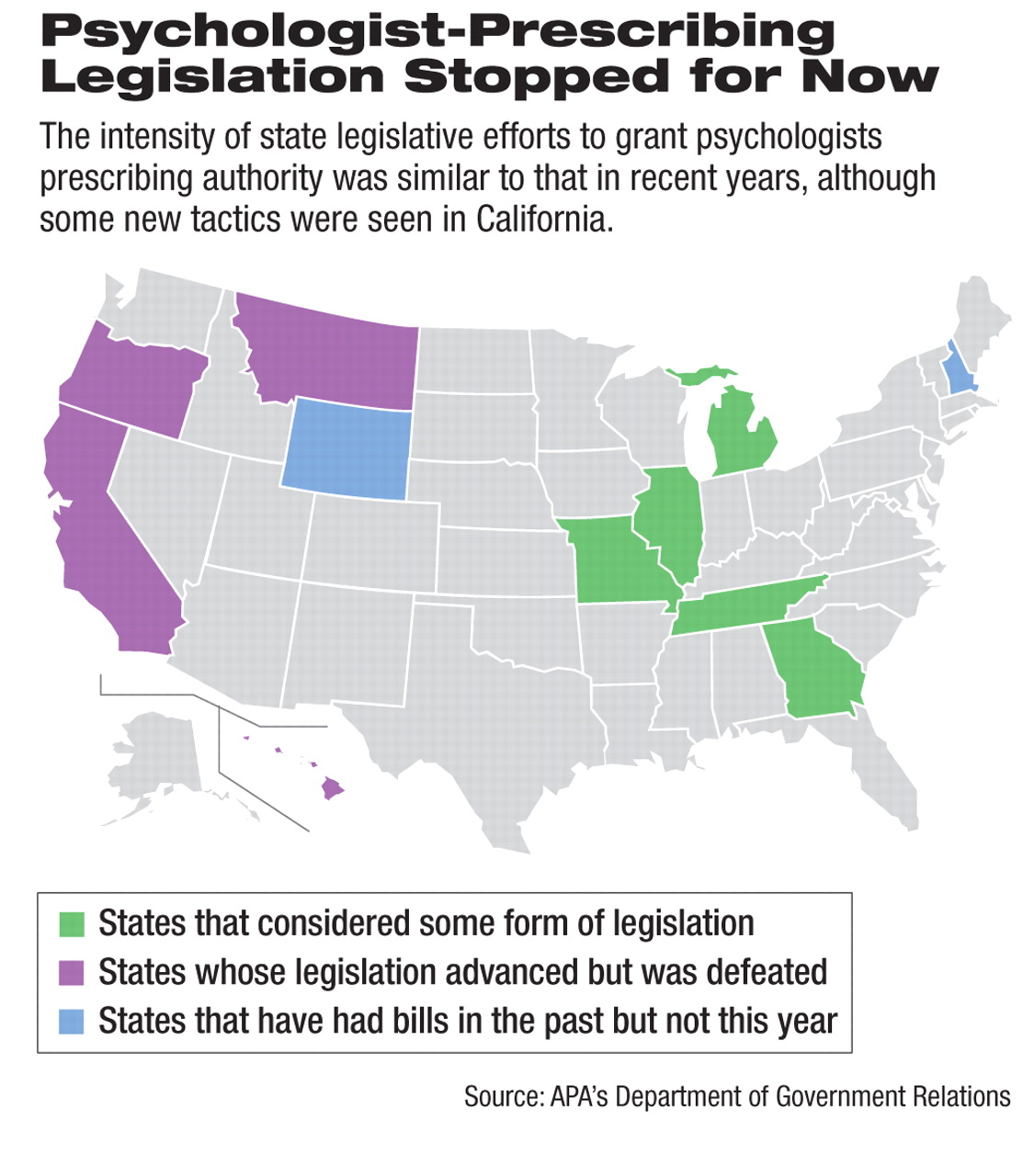Psychiatrists helped successfully halt bills in 10 states during the 2007 legislative season that would have extended prescribing privileges to psychologists. The legislation advanced in only four legislatures, including a high-profile measure vetoed by Hawaii's governor (Psychiatric News, August 3).
The measures ranged in scope from granting psychologists prescribing privileges to establishing psychologists as patients' primary clinicians. District branch leaders and APA officials credited the efforts of local psychiatrists and their legislator allies with defeat of the bills in what was, nationally, a busy but average year for such legislation.
“The legislative success achieved by the district branches and state associations this year was the result of strong collaborative efforts of APA, AMA, and other national medical specialties,” said Paula Johnson, deputy director of APA's Department of Government Relations, in an interview with Psychiatric News.
Chief among those successes was a veto by Hawaii Gov. Linda Lingle (R) of a psychologist-prescribing bill (SB 1004) that supporters claimed was modeled on a 1990s Department of Defense (DoD) pilot program. However, the governor concluded that the program the bill aimed to create differed“ significantly” from the DoD program because it lacked the requirements on the number of pharmacology classroom hours required and the number of inpatient and outpatient cases that were needed to qualify for a“ prescription certificate.”
Another difference was that the DoD program required close supervision by a psychiatrist with “advanced training in psychopharmacology,” while the rejected bill would have required any physician to supervise psychologists for only two hours a week.
“The governor understands that there are medical conditions that require medical training if you are going to provide that type of treatment,” said Jeffrey Akaka, M.D., a Hawaii psychiatrist and speaker of the APA Assembly, in an interview with Psychiatric News.
Although proponents of the psychologist-prescribing bill have pushed for its enactment for more than 20 years, psychology advocates declined to hold a veto override vote on it because its passage was the result of a close vote that would have fallen short of the two-thirds majority required in both chambers to override a veto.
Unions Active in California Approach
A much more expansive and wide-ranging legislative approach to expand psychologists' scope of practice was undertaken in California, where the Senate Committee on Business, Professions, and Economic Development voted in April to stop a prescribing bill for the year. That legislative reprieve is expected to be only temporary because of the powerful allies psychologist-prescribing advocates gained this year.
The American Federation of State, County, and Municipal Employees joined the California Psychological Association, and the Service Employees International Union (SEIU) joined the National Alliance of Professional Psychology Providers in pushing separate prescribing bills. The decision by the two unions to throw their significant resources behind the prescribing effort marks the first time that such a collaboration has happened anywhere in the nation, said psychiatry supporters.
“The presence of unions in the equation really changes things,” said Randall Hagar, director of government affairs for the California Psychiatric Association. “It's a fear factor because the unions have tremendous resources.”
The unions became involved, in part, to help their recruitment of psychologists who work in state hospitals and prisons as members. The California councils for the SEIU have made the bill a leading legislative priority and plan to devote to the effort some of a $50 million political war chest they established for “health issues” advocacy, Hagar said.
Another cause for concern: The unions and psychologist groups combined their resources and legislation into a single expansive bill (SB 993), which would have allowed psychologist prescribing and other scope-of-practice expansions. The bill's training and scope-of-practice authority would likely allow psychologists to function as mental health patients' primary care providers with authority to commit them and to order restraints, Hagar said.
Hagar said the presence of unions in the prescribing fight will require a new strategy to neutralize their impact in a legislature where they wield tremendous influence. That strategy will have to evolve quickly because the bill, defeated in committee, is allowed to return in 2008, during the second half of California's two-year legislative session.
Previous efforts over the last 11 years to pass a psychologist-prescribing bill in California generally never moved out of committee; however, a 2000 measure was approved by the Assembly.
Bills Stopped in Committee
Psychologist-prescribing bills in Oregon and Montana also saw action this year.
Local psychiatrists testified and lobbied against an Oregon prescribing bill (HB 2800) that passed the House of Representatives Health Committee but was not taken up by another committee. This was the furthest the prescribing effort has progressed in the state since first offered as an amendment in 2003. A similar bill was the subject of a committee hearing in 2005 but not a vote.
John McCulley, executive director of the Oregon Psychiatric Association, said the efforts of the state's psychiatrists to lobby against the bill were important to stop its advance. They were joined in their opposition by a coalition that included the Oregon Medical Association, the Oregon Pediatric Society, the Mental Health Association of Oregon, and the Oregon Board of Medical Examiners.
Montana psychiatrists helped defeat a similar bill (SB 522) in that state. The legislation was approved by a committee chaired by the bill's sponsor but fell short in a vote by the full Senate, said Donald Harr, M.D., a Montana psychiatrist who helped organize opposition to the bill. Although psychology advocates were brought in to testify from the only two states that allow psychologist prescribing—Louisiana and New Mexico—the bill was defeated after informative testimony from three psychiatrists and a floor speech by state Sen. Greg Lind, M.D., on problems that could stem from prescribing without medical training, Harr said. “He helped convince the majority of the people in the Senate to vote it down.”
Advocates of psychologist prescribing based the need for it on the lack of access in parts of the state. To address that and future psychologist legislative efforts, psychiatrists are examining ways to fund a state program for psychiatrists to give rural general practitioners in-depth training on the use of psychiatric medications.
“They probably see as many or more patients needing this care as psychiatrists do,” Harr said.

